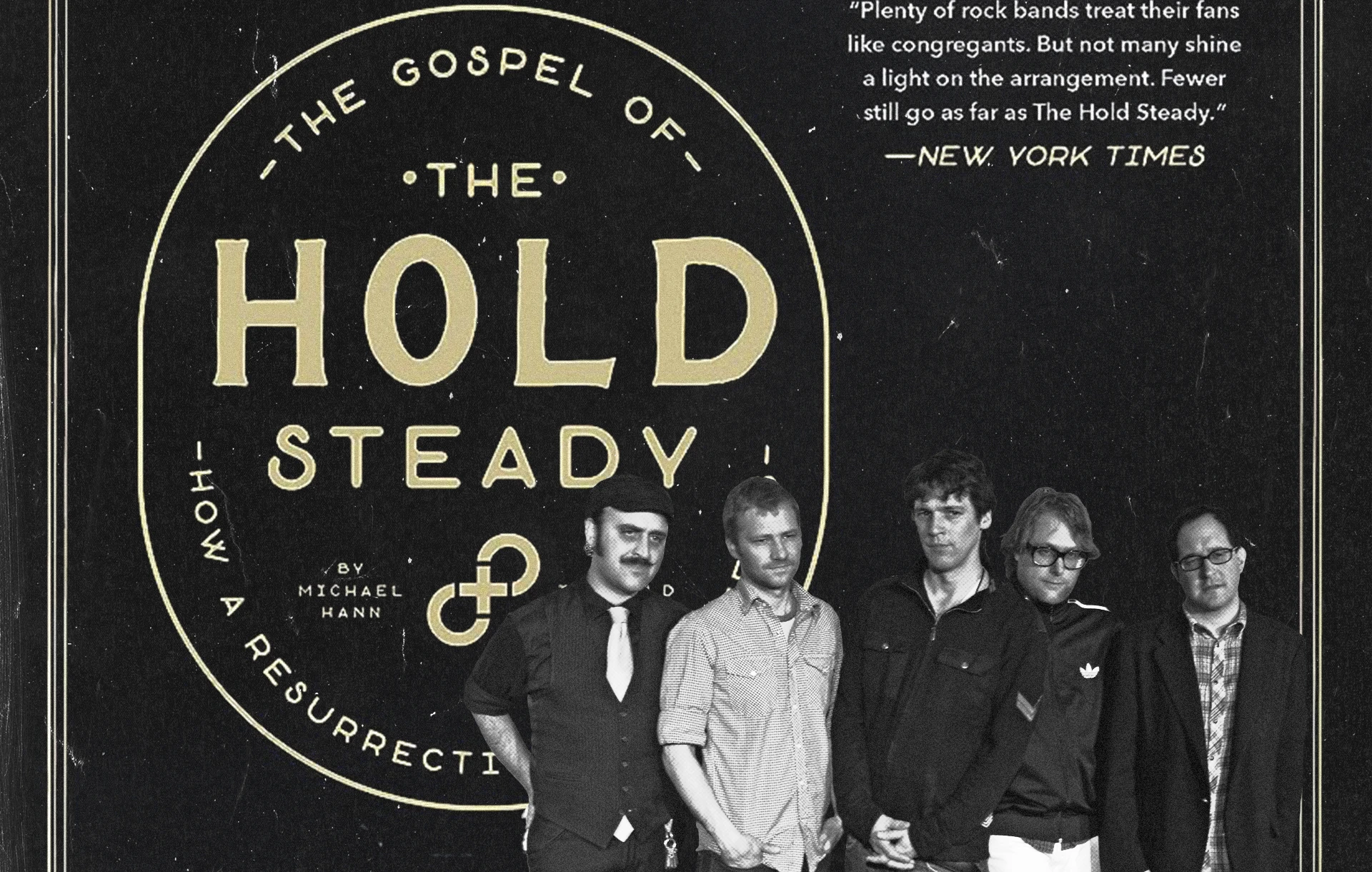One thing that struck me in the book is, it doesn’t seem like they’ve ever made a lot of money, right?
Well, they started making records just at the point when the bottom fell out of the recording industry. So I doubt they’re millionaires – I’ve never inquired about their personal wealth.
They make a living, and I think at this point in their lives, being in their 50s, and still able to make a living from being in a band, and also, not taking them out on the road 250 nights a year, I think they feel pretty comfortable and happy with that. And they do other things; Franz is a university professor, Galan has always tended bar, Bobby has part-share in Lake Street, the bar in Green Point, that has a big place in Hold Steady lore. They make the money they need out of The Hold Steady, and they live the life they need out of The Hold Steady, which I think at this point in their lives is more important for them.
Yea, Lake Street, that’s the Minnesota bar in Brooklyn. That was a big part of me getting into the band at first – Craig being from Minnesota, he would wear a Minnesota Twins jersey on stage, and he’d always do stage banter about baseball and other sports. One time I saw them the Twins had just made a trade with the Phillies, and he said “Be good to my guy Ben Revere.”
Being in the U.K., I know they go there a lot. Do you think there’s anything about them that particularly appeals to your side of the pond?
When they first came over they got absolutely ecstatic press, incredible press, not just from me. Uncut was all over them, Mojo was all over them, and they did not get a bad review. So that always helps. But I think they are so distinctly American, and so completely American, that for British people like me who love and obsess over America, they represent something that I suspect is hard to comprehend, for Americans.
I know there are Americans who have a view of Britain formed from Downton Abbey, where for British people it’s just a soap opera about posh people. But there’s something so incredibly American about them, that’s both familiar and alien, full of notions and ideas they recognize from the movies and TV, but with such detail and such intensity that you don’t feel like it’s unfamiliar.
In Britain, they’ve never been more than a big cult, but they are a big cult. I suspect they were always too American to really go to the next level. And also, as Craig acknowledges, let’s be honest, his voice was not made for daytime radio.
But, the very fact of them being such a great band, you go to see them, you’ll want to see them again. And they came over so often, through 2007 and 2008, that a bunch of people did go to see them, off the back of those reviews, and most of those people did not disappear. They pretty much know how many tickets they’re gonna sell, and if they go to London for three shows, they’re gonna fill it, especially with people who travel to the shows.
And that’s a really remarkable thing, I think about the band, that people will travel the world to see what is, in the great scheme of things, quite a small band. And I’m not sure that many other bands, of that stature, get to that kind of travel and devotion. The Hold Steady, playing little rock clubs, you’ve got people flying across oceans, from all around the world, I think is a really rare thing.
You mention briefly in the book, but you don’t go into the whole story, of when they did that song for Game of Thrones. What was the story behind that?
They just got approached. There’s no great story to it. It’s not a song that they like to dwell on very much, because they’re not particularly keen on it. It remains a matter of some dismay to them that it remains, I think it’s their second-most-streamed song on Spotify, after “Stuck Between Stations.” It was a financial offer, and it was a time in their career when they needed the money, so yea, they’ll do that.
There have been other TV things, like they appeared on Billions, playing the Axe Cap party, but that’s because Brian Koppelman, the showrunner, is a huge fan of the band and a friend of Craig’s. It was more, ‘That fits us.’ But Game of Thrones was more “this is money. “
Of the things you learned working on this book, what surprised you most?
I don’t know if anything really surprised me, because I’ve been friends with Craig for a very long time. There wasn’t that much that came as completely new information to me. I guess what surprised me the most was actually how frank people were willing to be about some of the dynamics within the band. I knew some of the issues between Tad and Franz, down the years, but I was very surprised that they were willing to talk so openly about it.
I know all the band members [well enough] to sit down and have a chat with, but Craig is the only one I know really well. So hearing Franz talk in-depth about the band, and about his insecurities within it, was interesting to me. That was the newest thing to me, hearing Franz’s version of that story.
Also, surprise is perhaps the wrong word. As I say, we’re all middle-aged people, we know that life is difficult, and I’ve known for a long time that the images of bands as groups of best friends is just not true. In all places, in any workplace where you spend 250 days a year with someone, you raise your back teeth at them, it’s true for every single band in the world.
But I liked how genuine the friendship and camaraderie are between those people now. I know that was not always the case, but now it really is true. The togetherness that they project when they’re on stage, when they do go on stage, is not put on. Because they see each other now when they want to, not because they have to. And they’re in a really good place, emotionally, with each other these days.
What have the reactions been like to the book so far?
The fans seem to like it… I’m glad the fans like it because that’s who the book is for. I’ve looked at some of the fan groups on Facebook, and on message boards, and they all seem to be saying nice things about it. The band was happy with it, and I’m delighted by that.
What I wanted to do with the book was not just tell the band’s story, but to communicate the love around the band. From the fans, but also from writers, from me and Rob, and Laura, and Isaac. And that love of the band really comes through. They made a difference in people’s lives. I mean, so many of us, you were looking for that band, in our mid-30s, you know the band who would take us back to feeling like we were 17, The Hold Steady have done that job. And I do still feel like a 17-year-old when I’m watching The Hold Steady.
I wanted to say, I really liked the “voices from the Unified Scene” part at the end. In a lot of books, that wouldn’t necessarily be one of my favorite parts of the book most of the time, but those are some great stories, some beautiful in there.
The only guidance I gave, when we put the call out, was, please don’t just tell me about your first Hold Steady gig, because everyone’s first Hold Steady gig is the same. Try to find something unusual that happened. And some of the stories that came in were just fantastic, really good. I’m really glad that one of the participants mentioned Howard Roberts because Howard Roberts is such a big part of The Hold Steady lore. I mentioned him in my essay as well.
Howard first heard of The Hold Steady when he read my Guardian review of Boys and Girls in America, and he got obsessed with them. Howard flies all around the world to see them, quite often he’s not even watching the show, he’s going to the bar and buying drinks for everyone. But anyone who has been to more than a handful of Hold Steady shows has met Howard, or has probably heard him shouted out from the stage. When The Hold Steady did the live streams during the pandemic, they shouted out Howard, over the Internet for the benefit of the watching world. I think it’s kind of a great thing that someone who’s not in the band is as big a part of the lore of the group as the musicians themselves. And I think Howard is like a symbol of all the Hold Steady fans.





